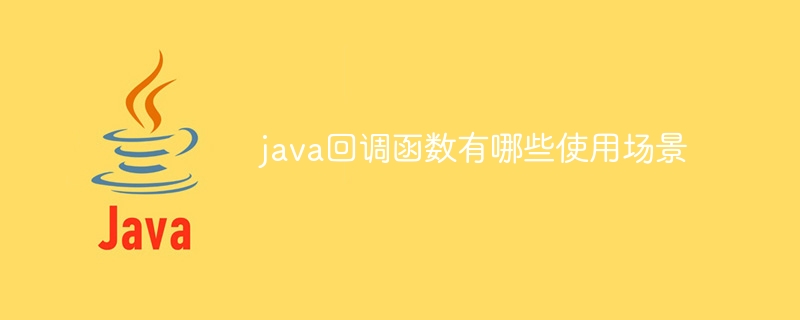Home >Java >javaTutorial >What are the usage scenarios of java callback functions?
What are the usage scenarios of java callback functions?
- 百草Original
- 2024-01-09 11:39:521434browse
Usage scenarios of java callback function: 1. Event processing; 2. Asynchronous programming; 3. Concurrent programming; 4. Game development; 5. Data processing; 6. Timer; 7. Logging; 8. Plug-in architecture; 9. Message queue; 10. API call. Detailed introduction: 1. Event processing. In GUI programming, callback functions are often used to respond to various user events; 2. Asynchronous programming. When processing time-consuming operations, asynchronous programming can be achieved using callback functions, which means that the operations will not By blocking the main thread, the program can continue executing while waiting for time-consuming operations to complete, etc.

The operating system for this tutorial: Windows 10 system, DELL G3 computer.
Java callback function is an important programming concept that allows a function to be passed as a parameter to another function and be called when needed. This mechanism is very useful in many scenarios. The following are some usage scenarios of using Java callback functions:
1. Event processing: In GUI (graphical user interface) programming, callbacks Functions are often used to respond to various user events, such as button clicks, mouse movements, etc. Callback functions allow a program to dynamically define actions that should be performed when specific events occur.
2. Asynchronous programming: When processing time-consuming operations (such as network requests, file I/O, etc.), asynchronous programming can be implemented using callback functions. This means that the operation does not block the main thread and the program can continue to perform other tasks while waiting for the time-consuming operation to complete.
3. Concurrent programming: In multi-thread programming, callback functions can be used for communication between threads. One thread can pass a callback function to another thread so that the latter can notify the former after completing a certain task.
4. Game development: Callback functions are often used in game development to handle game logic, such as updating character status, detecting collisions, etc. By splitting the game logic into multiple small callback functions, you can make the code easier to organize and maintain.
5. Data processing: When processing large amounts of data, you can use callback functions to process the data flow. Data can be passed to the callback function chunk by chunk or row by row for processing, which avoids loading all the data into memory at once.
6. Timer: The timer callback function can be called after a specified time interval and is often used for scheduled tasks, animation effects, etc.
7. Logging: When recording logs, you can use the callback function to customize the log output format. By passing a callback function to the logger, you can dynamically define how the log message is formatted.
8. Plug-in architecture: When building scalable applications, you can use callback functions as plug-in interfaces. In this way, developers can customize the behavior of the plug-in by implementing callback functions.
9. Message queue: When using the message queue to process asynchronous messages, the callback function can be used as the processor to receive the message. The message queue passes the message to the callback function for processing.
10. API calls: Many APIs (application programming interfaces) use callback functions to return results or handle errors asynchronously. For example, HTTP requests often use callback functions to handle response data or exceptions.
When using callback functions, you need to pay attention to some issues, such as avoiding circular references and memory leaks. In addition, since the callback function is executed in a different context, you need to pay attention to issues such as parameter passing and thread safety.
In short, Java callback functions play an important role in many scenarios. They make the program more flexible, efficient and easier to maintain. By rationally using callback functions, you can improve program response speed, reduce resource consumption, and enhance user experience.
The above is the detailed content of What are the usage scenarios of java callback functions?. For more information, please follow other related articles on the PHP Chinese website!

